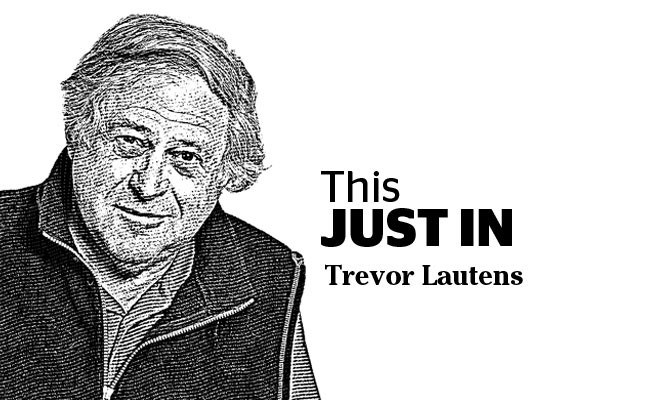Ah, the fluffy, comfy armchair.
And, less comfy but wonderfully safe, the leather-padded judge’s chair, from which justice is (judiciously, of course) dispensed.
Not to overlook the columnist’s perch on a privileged work chair where one can sit in pyjamas and slap together words telling the council, the legislature, the world, how things should be run.
And, when things go wrong, as they sometimes painfully do, how easily the above-named, and many ordinary Joes and Jills around the supper table or watching the six o’clock TV news, can decide what the cops should have done.
In that split second of decision.
Faced, say, by an unsmiling man (feminists won’t object to this gender stereotype) sporting a gun, or a knife, sometimes with terrified, wrong-place-at-the-wrong-time people screaming and ducking and fleeing (or dying) – a chaotic scene to which the cop has been urgently assigned.
Arrives cold. Has to sum up what’s happening – what’s happening by whom to whom – in one quick sweep of the situation. What if the cop shoots? A shot – as much luck as skill – that hits his moving flesh target?
What if his assailant stops, winged, but gun still in hand? Is a second shot justified? If he buckles to his knees, or sprawls flat, how about three, four, five?
And of course this officer is required to be utterly professional. Detached. Cool. Steely nerves. Just as you and I would be, right? Haven’t we seen enough movies and TV murder operas to know how to react flawlessly to instant peril?
But life, like love, isn’t Hollywood. There are no second (or 17th) takes.
On the instant social emails, on the evening news where editors shape the court of public opinion to a jury in armchairs, and in the papers whose columnists dissect the simplified morality tales of right and wrong that are the media’s meat, and months later from the bench or around the inquiry table, the officer’s action will be weighed. In the calm light of day.
Will it be determined exactly how many shots the cop should have stopped at? And also the line that separates his sworn duty to protect the threatened public from the constitutional rights of the threatening individual?
Now ratchet up the challenge – admitting what follows is a crude model, glossing on what the president of France called a war, a war unlike any in our own history.
Suppose the security police are grappling with protracted world-wide terrorism by radical Volcanovians. Most Volcanovian immigrants are peaceful. But a fringe group harbours grievances – colonialism, racism, poverty imposed by rich nations. The cops infiltrate. They compile lists, concentrically ranging from hard-core potential terrorists to sympathizers just mouthing off.
Or are they? The police have limited personnel, dollars, Volcanovian-speaking infiltrators. They must make knife-edge judgment calls: Drop investigating all-talk X; concentrate on dangerous Y.
But what if X’s radical maunderings later ripen into plans for action? Joining others – ideologically-pumped students, maybe – who acquire guns or grab bomb-making instructions off the Internet. With terrorizing success. A shocked nation would rip the cops from top to bottom. Bunglers. Incompetents. Fools. Why didn’t they collar X early on?
But if they had? Stupid. Repressive. Fascist. Why, they didn’t have enough on X then for a dog-licence conviction. Ever hear of individual rights?
Consider the organizational pressures. Up the managerial line, halt the investigation and many lives might be lost. The human factor: Ideals, careers, egos entwined with a thousand years of the rule of law pitted against gangster mind-set.
You can relax the whistling after passing the graveyard. In real-life Canada, no story has been dropped into the forget-hole as swiftly as that of gunman Michael Zehaf-Bibeau, who killed Cpl. Nathan Cirillo and was shot by security guards including Kevin Vickers in the very halls of Parliament, a door’s thickness from politicians who were the target. How close a call was that?
But the correct police call is always clear. Later. From the armchair.
Editor’s note: This column was written before Wednesday’s alleged terrorist incident in Strathroy, Ont.
• • •
My first meeting with Michael Lewis was unique. Telus was strike-bound. Lewis, a Telus executive, and another union-excluded employee, came to the house to fix a balky Internet connection.
Later, when a West Van councillor, Lewis was occasionally a delightful coffee-sharer with what he called this “ink-stained wretch.” I liked him immensely and admired his sense, thoughtful political ideas – far beyond the usual campaign banalities – and gentlemanliness. The community has lost a fine citizen and representative; I, if I dare say, a friend.
Former Vancouver Sun columnist Trevor Lautens writes every second Friday on politics and life with a West Vancouver bias. [email protected]
What are your thoughts? Send us a letter via email by clicking here or post a column below.



